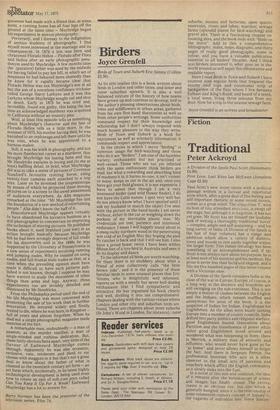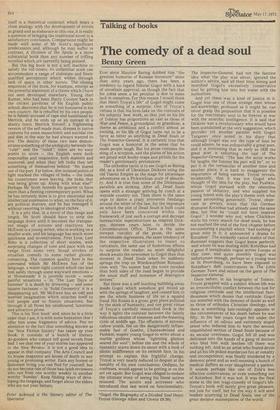Fiction
Traditional
Peter Ackroyd
A Division of the Spoils Paul Scott (Heinemann £4.90) First Love, Last Rites Ian McEwen (Jonathan Cape £2.50)
Paul Scott's new novel opens with a political passage written in a factual and reportorial style which, after a great deal of fine feeling and self-important rhetoric in some recent novels, comes as a great relief. The ubiquitous 'I', with its host of tiny attendant emotions, is swept off the stage; but although it is forgotten, it has not yet gone. Mr Scott has set himself the laudable task of writing a thoroughly traditional 'novel' — complex, ample and self-sustaining — and his long survey of India (A Division of the Spoils is the last of four volumes) has a range and ambition which allow a variety of dialects, tones and moods to rest easily together within the larger form. This Indian tetralogy has been something Of an accomplishment and, if Mr Scott is not always sure about his purpose, he is at least sure of his material apd his medium. His prose is never less than lucid1 and elegant, and it fills the five hundred pages of this latest volume with a Victorian ease.
A Division of the Spoils considers India at the close of the war in Europe; Europe, of course, is a long way in the distance and hostilities are still swinging on the sub-continent. This is not simply a matter of clashes between the English and the Indians, which remain muffled and anonymous for most of the book; it is the suspicion of Indian for Indian, Englishman for Englishman. As the allies were busily turning Europe into a number of county councils. India drifted into party politics and religious warfare, good Englishmen busied themselves about Partition and the transference of power while other good .Englishmen stood around and wondered what was happening to them: there is Merrick, a military man of seniority and influence, who would never have gone so far "at home" and never allows himself to forget the fact. And there is Sergeant Perron, the professional historian who acts as a silent observer to the small acts of paranoia and treachery which afflict the English community as it slowly sinks into the East. In a novel of this size and ambition, the edeo of it remains after the kaleidoscope of scenes and images has finally closed. The central theme is an obvious one, but one Which is generally bungled, since it is the relationship of some nineteenth century concept of 'history' tc, the vagaries of individual fate. Since 'history'
itself is a rhetorical construct which bears a close analogy with the development of novels as grand and as elaborate as this one, it is really a question of bringing the traditional novel to a satisfactory conclusion. Comparisons might be made with some of Mr Scott's significant predecessors and, although he may suffer in contrast, A Division of the Spoils is a more substantial book than any number of trifling novellas which are currently being praised.
But this big book is not a soft machine to satisfy the old-timers; its unfamiliar scale can accommodate a range of elaborate and finely qualified perceptions which wither through lack of space in other novels. The closing sequences of the book, for example, emerge as the powerful statement of a theme which I have not seen developed elsewhere. Young Hari Kumar, who had been Harry Coomer back in the cricket pavilions of his English public school, discovers that he is not honoured in his own country. He is rebuffed by his own people, he is falsely accused of rape and humiliated by Merrick, and he ends up as an outcast in a shanty town. Merrick himself, a frightening version of the self-made man, dresses in native costume for some masochistic and suicidal rite and dies in the way he had always wanted to live. The destiny of these two men demonstrates something of the ambiguity between the "ruler" and the "ruled"; there are no easy points to score — the English were both responsible and responsive, both masters and mastered, and when they left India they left something of themselves behind: "He stared out of the port. Far below, dim isolated points of light marked the villages of India — the India his countrymen were leaving, the India that was being given up. Along with what else?" Perhaps Mr Scott intends his quartet to have more than a fleeting contemporary point. What he has certainly done is to give emotional and intellectual expression to what, on the face of it, are political matters, and he has managed it without resorting to ideological cliches.
It is a pity that, in a novel of this range and length, Mr Scott should have to strip the language down until it becomes the transparent image of actions and reactions. Ian McEwen is a young writer, who is working on a smaller scale, and his language has much more quickness and inventiveness. First Love, Last Rites is a collection of short stories, with surprising changes of tone and pace with can range from some very broad strokes of situation comedy to some rather gloomy romancing. The common quality here is the command which Mr McEwen has of the language, a water-tight control which can lead him safely through some wayward emotions — in 'Homemade' it is juvenile incest — some painful situations — in The Last Days of Summer' it is death by drowning — and some bizarre fantasies — in 'Solid Geometry' it is a disappearing act. Mr McEwen has an odd and worried imagination which attaches itself to lost people and to frantic situations, but through it all flows his unlaboured, luxurious and attractive prose. This is his 'first book' and, since he is a little older than I am, it is with some hesitation that I offer him some fragments of advice. Pay no attention to the fact that something known as the 'New Fiction Society' has taken up your book: it consists of a bunch of literary do-gooders who cannot tell good novels from bad. I see that one of your stories has appeared in the New Review: it is not a good idea to appear in that company. The Arts Council and its house magazine are kisses of death to any young or promising writer. Earn any honest or dishonest living you can find for yourself, but do not become one of those baa-lamb reviewers who run from one worthy weekly to another worthy 'Sunday'. Keep finding ways of developing the language, and forget about the elders who are not your betters.



























 Previous page
Previous page